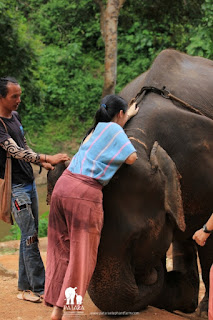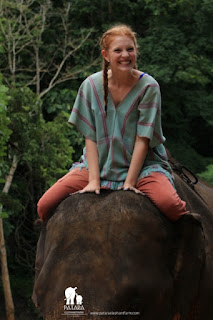 |
| Our elephants were so cute, even if they weren't the best at posing for photos |
Each member of our group was assigned their own personal elephant to help take care of for the day. After learning several commands in Thai and going over safety information, we fed our elephants bananas and began bonding with them. It was during this time that we had the opportunity to learn first hand about elephant mating. The mahouts are the guides at the Patara Elephant farm who have more than 10 years experience working with elephants.The mahouts told us that this is prime mating season, and that the male elephant was only 11 years old so this was his first season as a reproducing male. We also learned that female elephants only menstruate every four months and that gestation is approximately 19-23 months. In addition, mother elephants will nurse their babies for 3-4 years after birth. All of these factors contribute to a low inter-birth interval (IBI) for elephants, meaning that they cannot reproduce quickly. This is especially problematic as the number of elephants in the wild and in captivity has been decreasing dramatically in recent years.
 |
| Grace, Ireland, Catherine, and Anneliese bonding with their elephants |
The atmosphere at Patara is one of family, everyone working there is blood related or has worked there for so long that they are practically family. Everyone plays a specific role: the men are usually mahouts while wives, sisters, and girlfriends run the gift shop, admin, and make the beautiful clothing we wore to ride the elephants. Everyone agreed that we all really loved the hand made shirts, they were so comfy and colorful-the perfect elephant riding wear!
 |
| Kayla sporting our beautiful and functional riding shirts |
After feeding and our unexpected yet informative crash course in elephant mating, we took our elephants down to the river for bath time! Elephants should bathe once a day as it helps keeps their skin free from parasites but also helps to cool down their internal body temperature. Scrubbing the elephants was hard work, but incredibly rewarding because we were able to play with the babies afterwards. The most important thing we learned from bath time was that elephants DO swim with their trunks on ;)
 |
| Sophie and Juli bathing their elephants |
Prior to meeting our elephants for the day, a baby elephant near the check in area at Patara charged Dr. M! Unfortunately this event was not caught on video, but thankfully our fearlessly leader landed on his feet and was unhurt by the feisty baby elephant.
 |
| Dr. M with a baby elephant (not the one that charged him) |
As bath time concluded, we donned our riding gear and mounted our elephants-and headed out into the jungle! Not really we followed a clearly specified path, but it was a rather bumpy ride. To properly ride an elephant one has to sit directly behind the ears where the neck and head meet. Your knees rest atop the ears so that you can use your feet to direct the elephant forward by tapping the back of the ears. Sophie and her elephant, Arun, started out leading the pack at a nice leisurely pace. But soon Arun, who is a 4 year old female elephant, decided she wanted to pick up the pace. Sophie and Arun arrived at lunch 10-15 minutes before the rest of us.
 |
| Juli utilizing the trunk to mount her elephant |
 |
| John, looking fly as usual |
 |
| Ireland enjoying spending time with her elephant |
 |
| Grace enjoying the beautiful Thailand views |
 |
| Look at the difference in size between Sarah's elephant and Sam's! |
Elephants are incredibly intelligent creatures as they can understand many different commands while assessing their surroundings to determine the best route possible. This is mainly accomplished by using the trunk to feel along the ground as the elephant walks.
Lunch was a beautiful array of chicken, local fruits, rices, and vegetarian spring rolls. Unfortunately, we did not realize the Dr. M and Pi Peter and Pi Poad would be joining us so most of the food had already been consumed before they arrived on the hilltop to eat lunch with us (note to self: buy Dr. M and the Pi's dinner later this week).
Lastly, we said goodbye to our precious elephants, who we had grown to love so much during our time with them. As we were leaving, many of us got goodbye kisses from our elephants-so precious!
 Hey guys it's Sam! Today was great! At Patara I loved learning about elephant health and the different signs to look for when assessing an elephant. We learned how to ride them, how to tell if they were friendly, and how to wash them so their skin is healthy. My favorite part was befriending the elephants. My elephant was named Pansa (pahn sah), and I love her. I will name my first child after her because I love her so much. We were each given a personal elephant based on personalities and size. Pansa was only 6 years old so she was a tiny thing compared to Sarah's elephant who was 35 years old.
Hey guys it's Sam! Today was great! At Patara I loved learning about elephant health and the different signs to look for when assessing an elephant. We learned how to ride them, how to tell if they were friendly, and how to wash them so their skin is healthy. My favorite part was befriending the elephants. My elephant was named Pansa (pahn sah), and I love her. I will name my first child after her because I love her so much. We were each given a personal elephant based on personalities and size. Pansa was only 6 years old so she was a tiny thing compared to Sarah's elephant who was 35 years old.We were instructed to befriend them by feeding them and saying specific words. First, we had to hold a banana and say 'bon' (up), place the banana in their mouth and then say 'dee dee' (good boy/girl) and pet them under the eyes when they ate. We were given baskets full of bananas so the elephants would bond with us. Then we bathed them in the river and had to learn how to do the different brush strokes for their bodies, always with the grain of the skin. After we washed them we got to swim with the momma and baby elephants. It was so hard to stay on the elephants because they roll around in the water. Then we rode the elephants to the hill top for lunch, which was amazing. We were served rambutans, which as you know are my favorite! Today was one of the best experiences of my life and I will always love Pansa!
Hi everyone, Sarah here! Today was so amazin! I loved spending time my elephant, Boon Put who is a 35 year old male and the biggest elephant in our group. He definitely enjoyed being the leader while walking and frequently enaged in races with other elephants for the front spot. His mahout described him as strong-willed, determined, not always the best listener, and willing to do pretty much anything (including disobey direct orders) for food... remember, the elephants were assigned to us based on personality :)
Something that really stuck with me from today was our introductory talk before we even met the elephants. The Patara Farms employee who spoke to use about safety and Patara's mission, also touched on the 'trendy-ness' of conservation causes, especially via the internet. He believes that conservation efforts striving to really make an impact should encourage people to experience and know first-hand what they are aiming to conserve. This is why Patara Farms offers elephant experiences, so that people can see the difference between simply giving to causes and actually living in way that promotes conservation As a part of this field school, which is centered around the idea of One Health, the health of animal populations has been discussed: this being important because human and wildlife come into contact often. Understanding the role of each animal, elephants included, in the field of health is incredibly important for effective disease prevention and if necessary, disease control responses. We will be spending more time at Patara in the next few weeks so I hope that we will all have the opportunity to explore these topics further.
Thanks for reading our blog post! We'll see you next time!
Sam and Sarah






No comments:
Post a Comment
Note: Only a member of this blog may post a comment.